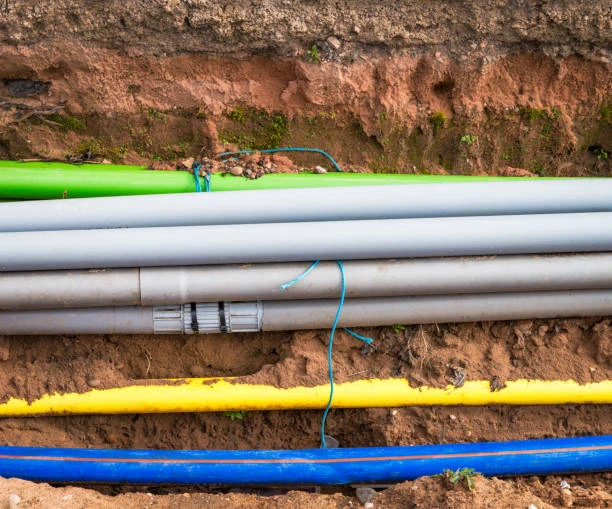In the evolving landscape of infrastructure development, the choice of materials is critical for ensuring durability, cost-effectiveness, and environmental sustainability. Among these materials, concrete pipes have long been a staple in construction and civil engineering projects. Recently, Lipjani, a notable player in the construction industry, has focused on contracting concrete pipes while simultaneously expanding its services to install plastic pipes. This article will explore the significance of concrete pipes, the advantages of plastic pipes, and the strategic decisions made by Lipjani to enhance its service offerings.
Understanding Concrete Pipes
Manufacturers commonly use concrete pipes in various construction applications, especially in drainage and sewer systems. These pipes are renowned for their strength, longevity, and resistance to environmental factors.
Types of Concrete Pipes
- Reinforced Concrete Pipes (RCP): These pipes incorporate steel reinforcement, making them suitable for high-load applications such as highways and heavy traffic areas.
- Plain Concrete Pipes: Typically used for less demanding applications, plain concrete pipes offer good strength for non-traffic areas.
- Precast Concrete Pipes: Manufacturers produce these pipes in controlled environments, allowing for customization for specific applications and ensuring quality and consistency.
Advantages of Concrete Pipes
Concrete pipes provide several benefits that make them a preferred choice for many construction projects:
- Durability: Concrete is resistant to various environmental stresses, including temperature fluctuations and chemical exposure, making concrete pipes long-lasting.
- Load-Bearing Capacity: They can withstand heavy loads, making them ideal for installation under roadways and in industrial settings.
- Cost-Effectiveness: While the initial cost may be higher than other materials, the longevity and minimal maintenance requirements of concrete pipes often lead to lower lifetime costs.
- Environmental Sustainability: Made from natural materials, concrete pipes are recyclable and contribute to sustainable construction practices.
The Role of Lipjani in Concrete Pipes Contracting
Lipjani has established itself as a leader in the contracting of concrete pipes, taking advantage of the material’s properties to deliver high-quality infrastructure solutions. The company focuses on both public and private projects, offering expertise in various applications.
Key Projects and Achievements
- Urban Infrastructure Development: Lipjani has successfully completed several projects involving the installation of concrete pipe in urban areas, enhancing the efficiency of drainage systems and mitigating flood risks.
- Industrial Applications: The company has also supplied concrete pipe for industrial facilities, ensuring reliable waste management and environmental compliance.
- Collaboration with Local Governments: By partnering with local governments, Lipjani has contributed to community infrastructure projects, reinforcing its commitment to enhancing public welfare.

Transition to Plastic Concrete Pipes
While concrete pipe remain a core focus, Lipjani has also recognized the growing demand for plastic pipe in the construction industry. Plastic pipe, particularly those made from materials like PVC (polyvinyl chloride) and HDPE (high-density polyethylene), offer distinct advantages that complement concrete piping solutions.
Advantages of Plastic Pipes
- Lightweight: Plastic pipe are significantly lighter than concrete, making them easier and cheaper to transport and install.
- Corrosion Resistance: Unlike concrete, plastic pipe are resistant to rust and corrosion, making them suitable for a variety of applications, especially in areas with aggressive soil conditions.
- Flexibility: Plastic pipes can be bent and shaped, allowing for easier installation in complex configurations.
- Cost-Effective Installation: The reduced weight and ease of handling lead to lower labor costs during installation.
Concrete Pipes Strategic Decision-Making by Lipjani
Lipjani decided to expand its services to include the installation of plastic pipes as a strategic move aimed at addressing diverse client needs and enhancing its market position.
Market Trends
The construction industry is witnessing a shift towards sustainable and efficient materials. By incorporating plastic pipes into its offerings, Lipjani aligns itself with market trends that favor lightweight and corrosion-resistant materials.
Client-Centric Approach
Understanding the varying needs of clients, Lipjani is focused on providing customized solutions. This includes offering a choice between concrete and plastic pipe depending on the specific requirements of a project.
Training and Development
To successfully implement plastic pipe installations, Lipjani has invested in training its workforce. This ensures that the organization equips all team members with the knowledge and skills necessary for handling both concrete and plastic pipe systems efficiently.
Concrete Pipes Environmental Considerations
As environmental concerns become increasingly important in the construction industry, Lipjani is committed to promoting sustainable practices. The company’s approach includes:
- Recycling Initiatives: Lipjani actively recycles old concrete pipe and plastic materials, contributing to a circular economy.
- Sustainable Sourcing: The company sources all materials used, whether concrete or plastic, responsibly, minimizing environmental impact.
- Innovative Solutions: Lipjani continuously explores innovative materials and technologies to enhance the sustainability of its projects.
Conclusion
The strategic focus of Lipjani on contracting concrete pipe while also incorporating plastic pipe into its service offerings demonstrates a commitment to meeting diverse construction needs. By balancing the durability and strength of concrete with the lightweight and flexible nature of plastic, Lipjani aims to enhance its competitiveness in the construction industry. As infrastructure demands evolve, the ability to adapt and innovate will be crucial for sustained success.
FAQs
1. What are concrete pipe used for?
Manufacturers commonly use concrete pipe in drainage, sewer systems, and various construction applications due to their durability and load-bearing capacity.
2. What are the advantages of using plastic pipes?
Plastic pipes are lightweight, corrosion-resistant, flexible, and generally more cost-effective to install compared to traditional materials like concrete.
3. How does Lipjani ensure quality in its projects?
Lipjani employs skilled professionals and adheres to strict quality control measures throughout the contracting and installation processes to ensure high standards.
4. Can concrete and plastic pipe be used together?
Yes, many projects can use concrete and plastic pipe together, taking advantage of the strengths of both materials depending on the application.
5. What is the environmental impact of using concrete pipe?
Concrete pipe are environmentally sustainable because manufacturers make them from natural materials, they are recyclable, and they have a long lifespan, which reduces the need for frequent replacements.


















